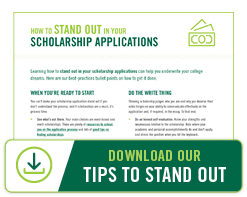Top Habits of Successful Scholarship Applicants

Gaining a scholarship can significantly ease the financial burden of higher education. However, with countless applicants vying for limited funding, standing out requires more than just good grades. Successful scholarship applicants possess a specific set of habits that set them apart. This article delves into the top habits that consistently lead to scholarship success. From meticulous planning and compelling storytelling to proactive networking and unwavering perseverance, we'll explore the key behaviors that transform hopeful students into scholarship recipients. By adopting these habits, aspiring scholars can maximize their chances of securing the financial support they need to achieve their academic dreams.
Top Habits of Successful Scholarship Applicants
Successful scholarship applicants consistently demonstrate a proactive and meticulous approach to the application process. They don't wait until the last minute, understanding that crafting a compelling application takes time and thoughtful effort. They are highly organized, managing deadlines and required materials with precision. Moreover, they possess exceptional communication skills, both written and verbal, allowing them to articulate their achievements, aspirations, and the reasons why they deserve the scholarship clearly and persuasively. Crucially, they are authentic and genuine in their essays and interviews, showcasing their true selves and their unique perspectives. Finally, successful applicants research extensively to identify scholarships that align perfectly with their academic profile, interests, and career goals, maximizing their chances of success.
Excellent Academic Record and Extracurricular Involvement
A strong academic record, including a high GPA and challenging coursework, is often a fundamental requirement for many scholarships. However, grades alone are rarely enough. Successful applicants demonstrate a well-rounded profile by actively participating in extracurricular activities, volunteer work, and leadership roles. These experiences showcase their commitment, teamwork skills, and passion outside the classroom, making them more appealing to scholarship committees. Participation in extracurriculars and community service shows dedication and a willingness to contribute, which are valuable qualities to demonstrate.
Exceptional Essay Writing and Storytelling Skills
The scholarship essay is often the most crucial component of the application. It provides an opportunity to showcase your personality, experiences, and aspirations in a way that grades and test scores cannot. Successful applicants possess exceptional writing skills, crafting compelling narratives that capture the attention of the reader and leave a lasting impression. They use vivid language, strong storytelling techniques, and concrete examples to illustrate their points and demonstrate their unique qualities.
Meticulous Attention to Detail and Proofreading
Even the most impressive application can be undermined by careless errors. Successful applicants pay meticulous attention to detail, ensuring that their applications are free from typos, grammatical errors, and factual inaccuracies. They carefully proofread every document multiple times and seek feedback from trusted teachers, mentors, or writing centers. A polished and error-free application demonstrates professionalism and respect for the scholarship committee's time.
Proactive Approach to Seeking Recommendations
Strong letters of recommendation can significantly strengthen a scholarship application. Successful applicants proactively seek recommendations from teachers, mentors, or employers who know them well and can speak to their abilities, character, and potential. They provide their recommenders with ample time to write thoughtful letters and offer them relevant information, such as their academic transcripts, resumes, and a brief summary of their achievements and aspirations.
Strategic Targeting of Scholarships
Applying for every scholarship under the sun might seem like a good strategy, but it can actually be counterproductive. Successful applicants are strategic in their approach, focusing on scholarships that align with their academic profile, interests, and career goals. They research eligibility requirements carefully and only apply for scholarships that they have a realistic chance of winning. This targeted approach allows them to focus their efforts and craft more compelling applications.
| Habit | Description | Benefit |
|---|---|---|
| Organization | Managing deadlines and materials efficiently. | Avoids last-minute stress and ensures completeness. |
| Communication | Articulating achievements and aspirations clearly. | Makes a strong and memorable impression. |
| Authenticity | Presenting oneself genuinely and honestly. | Demonstrates integrity and personality. |
| Research | Identifying suitable scholarships. | Increases chances of success by targeting appropriate opportunities. |
| Proofreading | Ensuring error-free applications. | Shows attention to detail and professionalism. |
What makes a scholarship applicant stand out?

Exceptional Academic Performance and Intellectual Curiosity
Exceptional academic performance serves as a foundation. However, a stand-out applicant goes beyond simply achieving high grades; they demonstrate a genuine thirst for knowledge and a willingness to challenge themselves intellectually. They show that they are not only capable of learning but also eager to explore new ideas and push the boundaries of their understanding.
- Consistently high grades and GPA in relevant subjects.
- Participation in advanced or challenging coursework (e.g., AP, IB, honors).
- Demonstrated intellectual curiosity through independent research or projects.
Meaningful Extracurricular Involvement and Leadership
Scholarship committees seek well-rounded individuals who contribute to their communities and demonstrate leadership potential. Meaningful extracurricular involvement goes beyond simply listing activities; it involves showcasing the applicant's commitment, impact, and the skills they have developed through these experiences. It's about highlighting what they have learned and how they have grown as a person.
- Consistent and significant involvement in a few key activities.
- Demonstrated leadership roles and responsibilities within those activities.
- Tangible impact or positive contributions made to the organization or community.
Compelling Personal Narrative and Authenticity
A compelling personal narrative is crucial for capturing the attention of the scholarship committee. This involves sharing personal stories, experiences, and challenges that have shaped the applicant's character and goals. Authenticity is key; the applicant must present themselves honestly and genuinely, allowing their personality and values to shine through. This is where the applicant connects their past, present, and future aspirations in a coherent and persuasive manner.
- Sharing relevant and impactful personal stories that reveal character and values.
- Demonstrating self-awareness and reflection on personal strengths and weaknesses.
- Articulating clear and authentic goals that align with the scholarship's mission.
Clear Understanding of the Scholarship's Mission and Values
A strong applicant demonstrates that they have thoroughly researched the scholarship and understand its mission and values. They articulate how their own goals and experiences align with the organization's priorities, showing that they are not just seeking funding but also a partnership with a like-minded institution. This demonstrates genuine interest and a commitment to the scholarship's cause.
- Clearly articulating the scholarship's mission and values in the application.
- Demonstrating how the applicant's own goals align with the scholarship's objectives.
- Providing specific examples of how the applicant will contribute to the scholarship's mission.
Strong Communication Skills and Attention to Detail
Finally, excellent communication skills and attention to detail are essential for conveying the applicant's qualifications effectively. A well-written and meticulously edited application demonstrates professionalism and respect for the scholarship committee. Grammatical errors, typos, and poorly structured essays can detract from even the most impressive achievements. Clarity, conciseness, and a professional tone are crucial.
- Well-written and grammatically correct essays that clearly articulate the applicant's message.
- Thoroughly edited and proofread application materials free from errors.
- Clear, concise, and professional communication throughout the application process.
What are the habits of scholarship?

Effective Time Management and Organization
Effective time management and organization are fundamental habits of scholarship. They enable individuals to allocate sufficient time for studying, researching, and completing assignments, while also preventing procrastination and reducing stress. This involves:
- Setting realistic goals and breaking down large tasks into smaller, manageable steps. This promotes a sense of accomplishment and keeps you from feeling overwhelmed.
- Creating a schedule or planner that allocates specific time slots for different academic activities. Consistency is key to building good habits.
- Prioritizing tasks based on their importance and deadlines. Learn to distinguish between urgent and important tasks.
Active Reading and Note-Taking
Active reading and note-taking are essential for comprehending and retaining information. Instead of passively reading through texts, active readers engage with the material by asking questions, identifying key arguments, and connecting ideas. Effective note-taking complements active reading by providing a structured record of important information and insights.
- Annotating texts by highlighting key passages, writing comments in the margins, and asking questions. Engage with the text and make it your own.
- Summarizing key ideas in your own words. This helps ensure comprehension and strengthens your understanding of the material.
- Organizing notes in a clear and structured manner, using headings, subheadings, and bullet points. Well-organized notes are easier to review and use for future reference.
Critical Thinking and Analysis
Critical thinking and analysis are crucial for evaluating information, identifying biases, and forming well-reasoned conclusions. These skills enable individuals to go beyond simply accepting information at face value and to engage with it in a thoughtful and discerning manner. The ability to analyze and synthesize information is a hallmark of scholarly work.
- Questioning assumptions and biases. Be aware of your own biases and be willing to challenge your own beliefs.
- Evaluating evidence and arguments. Look for credible sources and assess the strength of the evidence presented.
- Forming well-supported conclusions based on evidence and reasoning. Avoid making generalizations or drawing conclusions based on limited information.
Effective Communication and Collaboration
Effective communication and collaboration are essential for sharing ideas, receiving feedback, and contributing to the academic community. Whether it's writing a research paper, participating in a class discussion, or working on a group project, the ability to communicate clearly and collaborate effectively is vital for success.
>
- Expressing ideas clearly and concisely, both orally and in writing. Practice articulating your thoughts in a way that is easy for others to understand.
- Listening attentively to others and responding thoughtfully. Show respect for different perspectives and be willing to learn from others.
- Providing constructive feedback to peers and accepting feedback gracefully. Feedback is essential for growth and improvement.
Maintaining Intellectual Curiosity and a Growth Mindset
Maintaining intellectual curiosity and a growth mindset are fundamental for lifelong learning and academic success. A growth mindset emphasizes that abilities and intelligence can be developed through dedication and hard work, while intellectual curiosity fuels the desire to learn and explore new ideas. A combination of these two allows you to learn continuously from challenges and new information.
- Actively seeking out new knowledge and experiences. Don't be afraid to explore different fields and challenge yourself with new ideas.
- Embracing challenges as opportunities for growth. View setbacks as learning experiences and don't give up easily.
- Being open to new ideas and perspectives. Be willing to consider different viewpoints and challenge your own assumptions.
What makes you the best candidate for a scholarship?

Academic Excellence and Intellectual Curiosity
- My academic record demonstrates a consistent pursuit of excellence, reflected in my high GPA and challenging course selection. I consistently seek opportunities to expand my knowledge beyond the curriculum, participating in independent research projects and attending relevant workshops and seminars.
- I possess a genuine intellectual curiosity and a passion for learning, always eager to explore new concepts and perspectives. This drive fuels my dedication to academic pursuits and enables me to excel in challenging academic environments.
- Beyond grades, I actively engage with course material, asking critical questions and participating in class discussions to deepen my understanding. This proactive approach to learning demonstrates my commitment to intellectual growth and my ability to think critically and independently.
Demonstrated Leadership and Teamwork Skills
- I have actively sought leadership roles in various extracurricular activities, such as [mention specific activities like student government, clubs, or sports teams]. In these roles, I have honed my ability to motivate and inspire others, effectively delegate tasks, and collaboratively achieve common goals.
- I am a strong team player, recognizing the value of collaboration and diverse perspectives. I am adept at fostering a positive and inclusive team environment, actively listening to others' ideas, and contributing constructively to group projects.
- My leadership style is characterized by empathy and a commitment to empowering others. I believe in leading by example, fostering a sense of shared ownership, and supporting team members in reaching their full potential.
Commitment to Community Service and Social Impact
- I am deeply committed to giving back to my community and making a positive impact on the lives of others. I have volunteered extensively at [mention specific organizations and activities], dedicating my time and energy to addressing pressing social issues. This commitment stems from a strong sense of social responsibility and a desire to contribute to a more equitable and just world.
- My community service experiences have provided me with valuable insights into the challenges faced by marginalized communities. I have gained a deeper understanding of systemic inequalities and a renewed determination to advocate for social change.
- I believe that education is a powerful tool for social transformation, and I am committed to using my education to address societal challenges and create positive change. My goal is to leverage my skills and knowledge to contribute to a more inclusive and sustainable future for all.
Resilience and Ability to Overcome Challenges
- I have faced [mention specific challenges you've overcome, without being overly specific if you're not comfortable sharing details]. These experiences have taught me the importance of perseverance, resilience, and a positive attitude in the face of adversity. I have learned to view challenges as opportunities for growth and to embrace setbacks as valuable learning experiences.
- My ability to overcome obstacles has strengthened my resolve and determination to succeed. I am not easily discouraged by setbacks, and I am committed to maintaining a positive outlook and working tirelessly to achieve my goals.
- I have developed effective coping mechanisms for managing stress and maintaining a healthy work-life balance. This allows me to persevere through difficult times and maintain my focus on my academic and personal goals.
Clear Vision for the Future and Potential Contributions
- I have a clear vision for my future and a strong sense of purpose. I am passionate about [mention your field of study and career goals], and I am committed to making a meaningful contribution to this field through my research, innovation, and leadership.
- I am confident that my education and experiences will equip me with the skills and knowledge necessary to excel in my chosen field and to make a positive impact on society. I am eager to apply my learning to real-world challenges and to contribute to the advancement of knowledge and innovation.
- I am committed to lifelong learning and professional development. I plan to continue pursuing knowledge and skills throughout my career, ensuring that I remain at the forefront of my field and able to contribute effectively to the ever-evolving challenges and opportunities of the future.
What is the #1 way to increase your chances for a scholarship?

Focus on Academic Excellence
A stellar academic record is paramount. Scholarship committees often prioritize candidates with a high GPA and a challenging course load. This showcases your commitment to learning and your potential for success in higher education. To maximize your academic performance, consider the following:
- Prioritize your studies: Allocate sufficient time for studying and completing assignments.
- Seek help when needed: Don't hesitate to ask teachers or tutors for assistance if you're struggling with a particular subject.
- Develop effective study habits: Experiment with different study techniques to find what works best for you.
Highlight Your Unique Skills and Talents
Beyond grades, demonstrating unique skills and talents can significantly boost your scholarship application. This could include excelling in a specific subject, showcasing artistic abilities, or demonstrating leadership qualities through extracurricular activities. Consider the following to effectively highlight your skills:
- Participate in relevant extracurricular activities: Join clubs, organizations, or teams that align with your interests and showcase your skills.
- Document your achievements: Keep a record of your accomplishments, awards, and recognitions.
- Seek opportunities to develop your skills further: Take workshops, attend conferences, or pursue independent projects to enhance your abilities.
Craft a Compelling Scholarship Essay
The scholarship essay is your opportunity to tell your story and demonstrate your passion and motivation. A well-written essay can distinguish you from other applicants, even if your academic record is not perfect. These steps will assist you in writing a strong scholarship essay:
- Understand the essay prompt: Carefully read and understand the essay question or prompt before you begin writing.
- Brainstorm ideas: Take time to brainstorm ideas and develop a clear outline for your essay.
- Write with authenticity and passion: Let your personality and enthusiasm shine through in your writing.
Seek Out Scholarships That Fit Your Profile
Don't waste your time applying for scholarships that you are unlikely to win. Target scholarships that align with your academic interests, background, or financial needs. The more closely you match the scholarship criteria, the higher your chances of success. These are some steps to find the right scholarships for you:
- Research scholarship opportunities: Use online databases, scholarship directories, and your school's guidance counselor to find scholarships that are a good fit for you.
- Pay attention to eligibility requirements: Carefully review the eligibility requirements for each scholarship before applying.
- Prioritize scholarships with fewer applicants: Consider applying for smaller, lesser-known scholarships, as they may have fewer applicants.
Proofread and Edit Your Application Meticulously
A polished and error-free application is essential. Typos, grammatical errors, and poorly written essays can detract from your application, even if you have strong academic credentials. To ensure a flawless application:
- Proofread your application carefully: Take the time to carefully proofread your application for any errors in grammar, spelling, and punctuation.
- Ask someone else to review your application: Have a trusted friend, teacher, or family member review your application for clarity and accuracy.
- Follow all instructions carefully: Pay close attention to the application instructions and ensure that you have provided all required information.
Frequently asked questions
What is the most important habit of successful scholarship applicants?
Strong communication skills are crucial. Clearly and concisely articulating your achievements, goals, and how the scholarship will help you achieve them is vital. Demonstrating passion and genuine interest in your field of study makes your application stand out to scholarship committees.
How do successful applicants manage their time effectively?
Effective time management is key to meeting deadlines and producing high-quality applications. Creating a timeline with specific goals for each stage of the application process, such as researching scholarships, writing essays, and gathering recommendation letters, helps you stay organized and avoid last-minute stress. Prioritizing tasks and avoiding procrastination ensures you submit complete and polished applications.
What role does strong writing play in a successful scholarship application?
Exceptional writing skills are fundamental to conveying your story and persuading the selection committee. Crafting compelling essays that highlight your strengths, experiences, and aspirations can significantly increase your chances of winning a scholarship. Paying close attention to grammar, spelling, and clarity is crucial for presenting a professional and polished application.
How important is it to tailor each application to the specific scholarship requirements?
Tailoring each application to the specific criteria of the scholarship is extremely important. Thoroughly researching the scholarship's mission and values allows you to align your essay and qualifications with what the organization seeks in its recipients. Highlighting relevant experiences and skills that demonstrate your suitability for that particular scholarship shows that you've taken the time to understand their goals and priorities.
